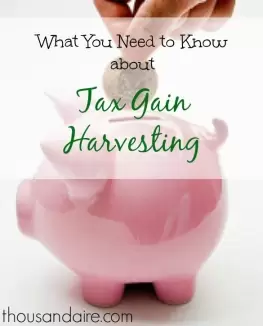 Perhaps you’ve heard of tax-loss harvesting. It’s a tax minimization strategy in which you sell stock that you’ve lost money in, in order to capture the tax deduction you get by recognizing the capital loss. It is a common tactic that can add a little bit to your overall returns. Let’s say that you own two stocks, ABC and XYZ. ABC has done really well, and you’ve made $5,000. XYZ has done pretty poorly, and you’ve lost $5,000. Generally, it’s a bad idea to sell your ABC stock (all other things equal) because it creates a tax bill. Selling your XYZ stock can be a good idea (all other things equal) because it creates a tax deduction.
Perhaps you’ve heard of tax-loss harvesting. It’s a tax minimization strategy in which you sell stock that you’ve lost money in, in order to capture the tax deduction you get by recognizing the capital loss. It is a common tactic that can add a little bit to your overall returns. Let’s say that you own two stocks, ABC and XYZ. ABC has done really well, and you’ve made $5,000. XYZ has done pretty poorly, and you’ve lost $5,000. Generally, it’s a bad idea to sell your ABC stock (all other things equal) because it creates a tax bill. Selling your XYZ stock can be a good idea (all other things equal) because it creates a tax deduction.
Caveats for Tax Loss Harvesting
There are a couple problems with tax loss harvesting. Naively it seems bad because if your goal is to “buy low and sell high” you’re always selling lower than you’re buying with tax loss harvesting. You might be inclined to sell your losing stock then rebuy the stock immediately afterward to gain the tax benefit without having to give up the stock. Unfortunately, this is called a wash sale. If you repurchase within 30 days then you don’t get the tax deduction.
As an example, let’s say that you bought 100 shares of Coke stock on April 4th for $4700, then sold the Coke stock April 21st $4300. If you wanted to keep that $400 tax deduction you wouldn’t be able to repurchase the Coke stock until May 22nd.
Enter Tax Gain Harvesting
Tax gain harvesting on the other hand comes with none of those caveats. “But Adam,” I hear you cry, “why would you want to sell stock triggering capital gains taxes early!?”
Well, if you’re a Thousandaire like me then you may not be in your highest earning years. (Really we’d like to be millionaires by our peak earning years). In fact, if you make less than about $47,850 ($37,500 + $10,350 for the personal exemption and standard deduction) you probably don’t have to pay long term capital gains taxes! This means that any stock you own you can sell and keep the income tax free. You do need to make sure that you don’t sell enough stock to push yourself into the higher tax bracket.
Caveats for Tax Gain Harvesting
This is the part where I warn you again about the wash sale rule, but that’s the good news. The wash sale rule doesn’t apply to tax gain harvesting. (Disclosure: Check with your accountant. I am not an accountant. I just kind of look like one.) This means that if you have an investment which you have held for more than a year, you could sell it and immediately repurchase it in order to take advantage of a higher cost basis when you sell it in a future year.
For example, I own 100 shares of Microsoft that I originally purchased three or four years ago at $25 per share. They now trade for roughly $50 per share. I could sell them tomorrow and repurchase them immediately. This would add $2500 of capital gains income to my tax bill in 2016. Fortunately, I would probably owe $0 on those gains because I am in the 0% bracket for long term capital gains.
Suppose in the future I’m in a higher tax bracket and have to pay 15% on my long term capital gains. Suppose also that Microsoft shares are trading at $100 per share and I need to sell. (Maybe a better investment has come up, or I simply need the money for something). If I don’t use tax gain harvesting then I’ll have to pay taxes on $7500 of capital gains ($1,125). If I do use tax gain harvesting tomorrow then I’ll have to pay taxes only on $5000 ($750) of capital gains because I already recognized $2500 of it in 2016. Tax gain harvesting will have saved me $375, well worth the $10 of transaction fees I’ll have to spend buying and repurchasing the Microsoft stock.
Yay?
This is one of those cases where planning your tax situation in advance can have some advantages. You may also be inclined to do your tax gain harvesting at the end of the year, when you have the clearest picture of how your income will turn out. Capital gains taxes may not be this low for long and the tax brackets may not be so favorable in the future.
All tax deferred accounts IRAs, Roth IRAs, 401k’s, 403b’s etc are basically equivalent to not paying taxes on capital gains. You all should know by now how much I love these sorts of accounts. However, if you already don’t pay taxes on capital gains because you’re in the 15% bracket, then you want to recognize as much capital gains at a 0% tax rate as you possibly can.
Adam Woods is a physicist. His research interests include building software to run and build geomagnetic models. Adam got interested in personal finance in the great recession when it became obvious an interest was necessary.
After harassing his friends and family (and a short intervention) he took to the web where he blogs about finance, investment, politics, and economics.
Adam is currently located in Boulder, Colorado where he can generally be found hiking, biking, or running a D&D campaign. He can also be contacted at adamwoods137@gmail.com.



Good tax advice – and its great that you are so conscious of taxes and investments while still a Thousandaire (like the rest of us!). I wish more people would be interested in this stuff early in their career while time and compounding are still on their side!
Adam – does this apply to people who have very modest portfolios? For example, what if you only have $ 5,000 to $10,000 worth of stock? How does that change the equation?
In my view this works best with a smaller portfolio. The main thing is that the tax savings (usually no more than 15% times your gain on the position) need to be greater than the transaction fee that your broker charges. (In my case $5 to sell and $5 to rebuy). This should be a low bar as that means that you’re looking at long term positions which have appreciated more than $66.